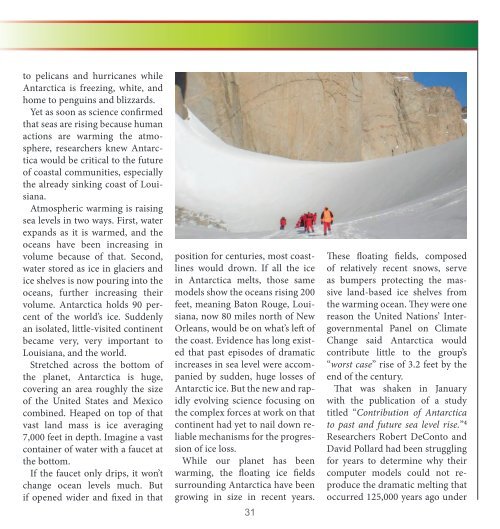GSN_May_FINAL_Yumpu
Create successful ePaper yourself
Turn your PDF publications into a flip-book with our unique Google optimized e-Paper software.
to pelicans and hurricanes while<br />
Antarctica is freezing, white, and<br />
home to penguins and blizzards.<br />
Yet as soon as science confirmed<br />
that seas are rising because human<br />
actions are warming the atmosphere,<br />
researchers knew Antarctica<br />
would be critical to the future<br />
of coastal communities, especially<br />
the already sinking coast of Louisiana.<br />
Atmospheric warming is raising<br />
sea levels in two ways. First, water<br />
expands as it is warmed, and the<br />
oceans have been increasing in<br />
volume because of that. Second,<br />
water stored as ice in glaciers and<br />
ice shelves is now pouring into the<br />
oceans, further increasing their<br />
volume. Antarctica holds 90 percent<br />
of the world’s ice. Suddenly<br />
an isolated, little-visited continent<br />
became very, very important to<br />
Louisiana, and the world.<br />
Stretched across the bottom of<br />
the planet, Antarctica is huge,<br />
covering an area roughly the size<br />
of the United States and Mexico<br />
combined. Heaped on top of that<br />
vast land mass is ice averaging<br />
7,000 feet in depth. Imagine a vast<br />
container of water with a faucet at<br />
the bottom.<br />
If the faucet only drips, it won’t<br />
change ocean levels much. But<br />
if opened wider and fixed in that<br />
position for centuries, most coastlines<br />
would drown. If all the ice<br />
in Antarctica melts, those same<br />
models show the oceans rising 200<br />
feet, meaning Baton Rouge, Louisiana,<br />
now 80 miles north of New<br />
Orleans, would be on what’s left of<br />
the coast. Evidence has long existed<br />
that past episodes of dramatic<br />
increases in sea level were accompanied<br />
by sudden, huge losses of<br />
Antarctic ice. But the new and rapidly<br />
evolving science focusing on<br />
the complex forces at work on that<br />
continent had yet to nail down reliable<br />
mechanisms for the progression<br />
of ice loss.<br />
While our planet has been<br />
warming, the floating ice fields<br />
surrounding Antarctica have been<br />
growing in size in recent years.<br />
31<br />
These floating fields, composed<br />
of relatively recent snows, serve<br />
as bumpers protecting the massive<br />
land-based ice shelves from<br />
the warming ocean. They were one<br />
reason the United Nations’ Intergovernmental<br />
Panel on Climate<br />
Change said Antarctica would<br />
contribute little to the group’s<br />
“worst case” rise of 3.2 feet by the<br />
end of the century.<br />
That was shaken in January<br />
with the publication of a study<br />
titled “Contribution of Antarctica<br />
to past and future sea level rise.” 4<br />
Researchers Robert DeConto and<br />
David Pollard had been struggling<br />
for years to determine why their<br />
computer models could not reproduce<br />
the dramatic melting that<br />
occurred 125,000 years ago under


